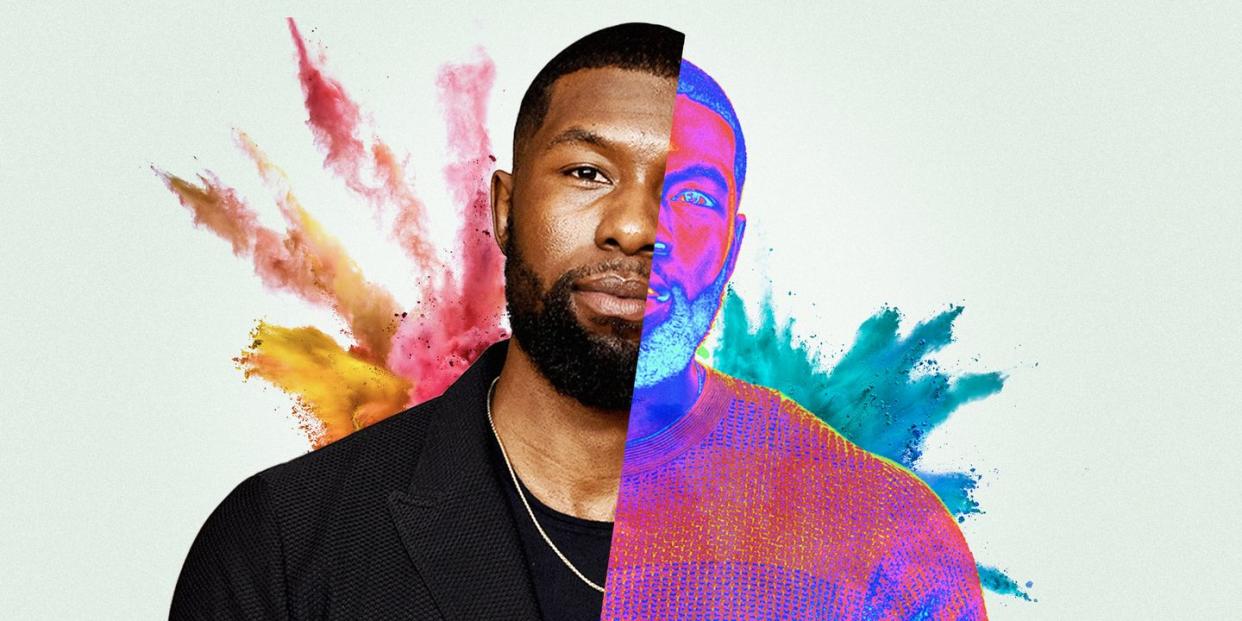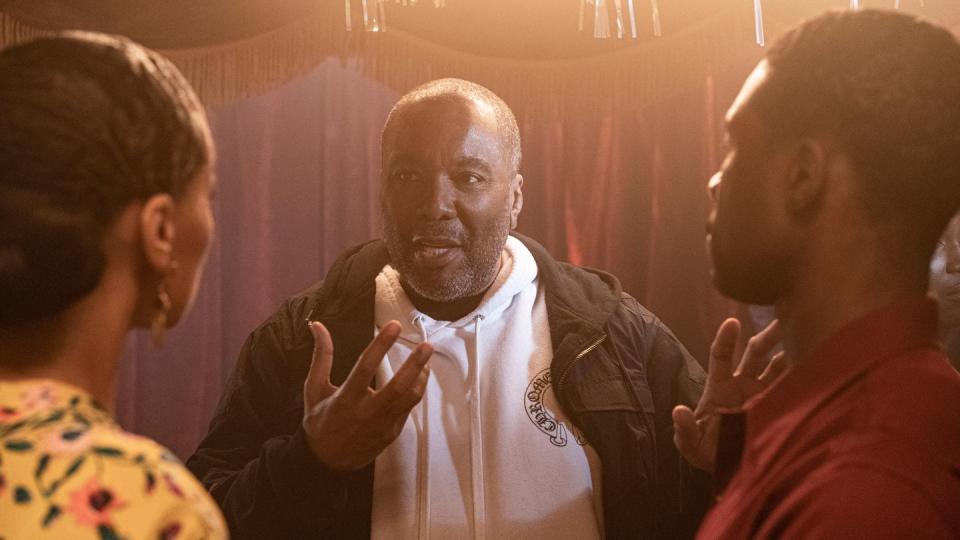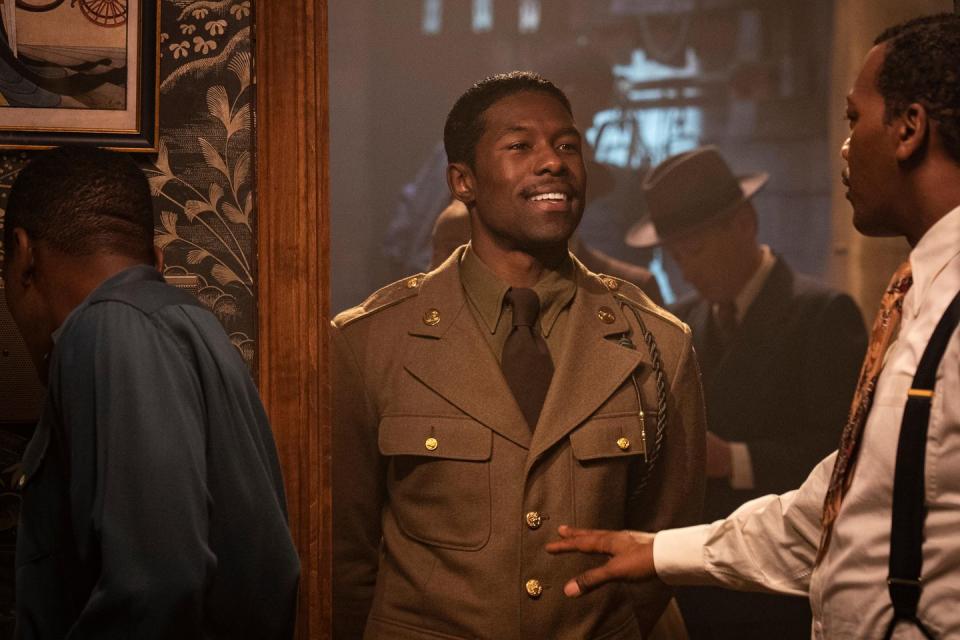The Technicolor World of Trevante Rhodes

- Oops!Something went wrong.Please try again later.
There is this neurological phenomenon known as synesthesia. It’s when your senses kind of overlap. You might read numbers as colors. One is white, two is red, three is blue, four is yellow, for example. In other instances, you might taste noise. There’s not a lot known about the condition, but it affects approximately three percent of the world’s population. Some studies suggest it exists more predominantly in creative minds. Trevante Rhodes tells me that, to him, the color of The United States vs. Billie Holiday is maroon. Moonlight is magenta, in case you were curious.
But if you’ve ever taken a painting and held it close to your face—so close that your nose touches the canvas—you can see that there’s a chaotic rhythm in the brushstrokes. Not every color is as it seems. Magenta is not a naturally occurring color, so much as it’s an amalgamation of red and violet, which is an amalgamation of red and blue. And that doesn’t even factor in how the bristles hit the canvas. How they were carrying the paint. How it might have streaks of color from another stroke. Another painting. Another life.
Rhodes is a self-taught student of art, whose admiration of color and details seeps into his role in The United States vs. Billie Holiday, out now on Hulu. After starring in Moonlight, a 21st century masterpiece, he appeared in a trio of action films then stepped back from the spotlight. Now, after three years, he returns to play Jimmy Fletcher, a Black federal agent tasked by his white superiors with implanting himself in Holiday’s life to bring her down for drug use. History remembers Fletcher as the man who betrayed Holiday. But Rhodes, a student of shades and colors, knows that Fletcher’s truth is somewhere in the details often overlooked.
Before our conversation begins, Rhodes turns his camera out to show me the snow outside the sliding door of his mom’s house in Austin. A six-inch deep blanket of white is out there, causing all kinds of problems for a state unprepared for the weather. Southerners don’t do snow. And Rhodes, a proud Louisianan and Texan hybrid, certainly did not expect to be half a foot deep in it, waiting for an hour or so of electricity that punctuates ten hour stretches without. But of all the people Rhodes could be stranded with, mom is a top choice. “I come from a family of strong Black women. Like my great-grandmother raised nine children by herself in Backwoods Louisiana,” he says. “My mom raised two boys here by herself. There's a wisdom in being a single Black mother, man.”
Their support helped Rhodes focus on his career. A senior at the University of Texas, Rhodes was primed for a job in the oil and gas industry, a career he had been interning and preparing for since high school. Then in 2012, right after his senior year, he decided to follow a theater professor’s advice and move to Los Angeles, which he said was a gamble in “the most beautiful way, but most terrifying way.” For years, he had been strong (a.k.a. stoic) for his family, particularly after his grandmother’s death in high school. He’d followed this trajectory for a particular life, but now in Los Angeles, he had stepped away from the plan. Then randomly, the feelings came rushing in. “I was walking and it just hit me, bro,” he explains. “Man… I’d wake up and start crying for like a week. It was crazy. And then after that, I don't know, my poetry got better. It was just like, I just felt better.”
Rhodes’ work, up to that point, was primarily in student films—shoestring budgets with even smaller crews. He might be the star, but some days, he was also the lighting guy. “I was able to get these little bit parts here and there,” Rhodes said. Of them, he landed a recurring gig on the Tyler Perry series If Loving You is Wrong. Amid all of that came Moonlight. While he knew something special was on the horizon, Rhodes says the experience wasn’t incredibly different. “[Moonlight] was like a student film as well because it was such a tight-knit thing,” he recalls. “I felt like after that I knew how to make films.”
Barry Jenkins’ 2016 Best Picture winner was Rhodes’ introduction to the upper echelons of Hollywood. The fanfare and the accolades were incredible, but Rhodes insists his biggest takeaway from Moonlight was the experience of making a film. “When you look at a Rockwell painting, it's a feeling. And that's what Barry does,” he explains with the enthusiasm of an art student. “It's about having the opportunity to be a part of those paintings and be as profound a color as you can.” What followed was an onslaught of visibility. The day after the Academy Awards, you likely saw Rhodes on your timeline, wearing nothing but a pair of Calvin Klein briefs. The face of Moonlight was everywhere. “I'm a country dude, man,” he says, refusing to acknowledge that he’s built like a brick shithouse, to take a phrase we use in the South. “I'm out in the outskirts, not really paying attention, so it didn't really affect me that much.”
From 2017 to 2018, Rhodes pivoted hard from indie prestige of Moonlight. In the course of a year, he appeared as a muscly sergeant in 12 Strong, a former Marine in The Predator, and a soldier-like survivor named Tom in the Netflix apocalyptic thriller, Bird Box. And then suddenly, Trevante was gone. No new projects on his IMDb page. No media appearances. Total silence. Fans online theorized about his disappearance, speculating that he wasn’t committed enough for the industry.
He says it’s simpler than all that: “I needed this feeling again.” That’s not to say he didn’t appreciate his string of soldier-driven action thrillers. Rhodes had a custom painting done of 2018—a three part series titled “A Soldier’s Story,” (a nod to role model Denzel Washington), highlighting each of his films. But he remembered Moonlight and its colors. “I had to take a break to sit back. Cause you can start working and just keep working and keep working,” he says. “But I'm the kind of person, bro, I got to see where I'm going. I like to drive slow.”
Part of that journey included sitting down with Lee Daniels at the end of 2018 to discuss what an adaptation of Billie Holiday’s life might look like. The meeting had been a long time coming. “I had been wanting to work with Lee because his sister Leah, Leah and Kim Coleman and Lindsay Graham, three casting directors who always brought me in since I moved to L.A.,” Rhodes explains. “They always saw something. So I was like, ‘Yo, I have to work with Lee.’”
Like Jenkins, Daniels' style is singular. Inspired to create the film without the influence of alcohol or drugs, The United States vs. Billie Holiday is Daniels’ first sober film. The question, of course, is whether Daniels could evoke his polarizing, chaotic style in this new chapter. “Barry is more Eastern philosophy, kind of a slow Zen person. That's Barry, and Lee is more abrasive, more visceral. That's just what Lee does in the most beautiful way with his works,” Rhodes says of Daniels. “To be able to do that, it's just such a unique—it's energy.” The two discussed a few different options for Rhodes in the early parts of 2019, but it was later in the year that Daniels landed squarely on the Holiday biopic. Rhodes was immediately interested.
Set partly in the South, Lee shot the film in Montreal, though Rhodes says it’s a great replacement. (“It even smells like the South.”) That is also what partly drew him in. “There's a depth in my soul and being from the South, man, the soul down here? We come from a different tribe.” But what pulled Rhodes’ attention most was the idea of stepping into the role of Jimmy Fletcher. Painted in history as the Black man who betrayed Holiday, Rhodes devoured books on Holiday and Fletcher and their relationship. He’d take notes on the parts he felt mainstream history had missed. Then he’d send the best ones to Daniels. In his assessment, Rhodes believes that history had remembered Fletcher for his faults, but none of his circumstances or motivations.

“One of the things that he was most proud of was his ability to code switch and his ability to feel like a chameleon,” Rhodes says of Fletcher. “To be able to be hip with the cats when he was hip. But then also be strong and proud whenever he's speaking to his superiors.” But the main conflict that Fletcher faces in the film is when the chameleon’s colors are at odds with one another. In the film, Fletcher’s mother insists that the feds’ interest in Holiday was squarely about silencing her incendiary performances of “Strange Fruit.” The song has become known as one of the most recognizable anthems of civil rights, painting a gruesome picture of the lynchings of Black people across America. Fletcher’s mother wasn’t alone in her assessment—historians also believe that the fight against Holiday was to stop her from fanning the flames of the growing movement. Fletcher did not agree. He was certain that the war on drugs was a stepping stone for, not an attack on, the Black community.

Their relationship was a complex one. Holiday tracked Fletcher down and sent him a signed copy of her 1956 autobiography, writing inside: “Most federal agents are nice people. They’ve got a dirty job to do and they have to do it. Some of the nicer ones have feelings enough to hate themselves for what they have to do. Maybe they would have been kinder to me if they’d been nasty; then I wouldn’t have trusted them enough to believe what they told me.” Not until much later did Fletcher realize how damning his role in Holiday’s life was.
“He was caught up in a shitty situation and he was someone trying to prove himself to himself. So that's a double negative, you know what I mean?” Rhodes explains. “I think in this story, we were able to empathize with him because we understood he was just someone who was just caught up.”
This central moral struggle, and understanding the relationship between Fletcher and Holiday is the challenge that intrigued Rhodes about this role.
“You are what you eat. So it's like, if I'm constantly being fed by this person, I'm going to obviously emulate them in some way,” he says. “So that to me was so necessary and portraying him in that way.”
The film is unnervingly relevant in 2021. As the film notes, an anti-lynching bill was introduced to Congress in the ‘30s. The most recent one was introduced in 2019 by now Vice President Kamala Harris. Neither passed. America is still without anti-lynching legislation. When I ask Rhodes about that, the tone of our conversation shifts, landing somewhere between exhaustion and frustration.
“Yeah. That's...,” he says, shaking his head. “That’s… that’s… that’s sad man.” He trails off.
I ask if the uptick of Black stories in Hollywood has made progress. If he feels like we’ve really made progress in the way that we should.
“In the way that we should is what's going to hold me up. But if you cut that off, obviously yes,” he says. “There's a movie for everybody now. So in that regard, we're in a much, much, much better place. Will that trickle into society essentially?”
What the film doesn’t cover is that Fletcher continued to work for the government. “Practically, he had to continue working for them,” Rhodes says. “Just to imagine what he felt like after that, you know what I mean? Then to continue working for them. His soul was, I don't know what.” Rhodes takes a moment to remind me of the final scene of the film: Fletcher bent over against a black door that will not open. The audience cannot see his face. Holiday has died. He is bent in such a way that his body is contorted, as if he’s carrying something we cannot see. Something some of us cannot know.
“Talk is cheap at the end of the day,” Rhodes says plainly. “It's easy to say you want to do something, but walking to do it is very, very difficult. Nothing works as fast as you would like. It just is what it is.”
Billie Holiday’s life story reemerging in 2021 feels almost willed to be. For Rhodes to play part in it does as well. Rhodes' resurgence is marked by a story sopped in everything good and bad from the South, about a woman who reckoned with the norm until the moment she died. “The art that you see now,” Rhodes says. “The most abrasive paintings that people still talk about today are the shit. Back then they were like, what? You know what I mean? It's always that kind of a thing.”
“Everything I choose to do is representative of who I am in some way to kind of show you more about me,” Rhodes says. The maroons, the magentas, the soldier inspired trilogy pieces. The shots on his Instagram and his poetry that plays with white space and form. “As an artist, you're trying to make something truthful, so that you get everyone's attention. That's the artists' job, man. That's always been the artists' job to speak truth to power or to attempt to. Some artists got killed for it.”
You Might Also Like

